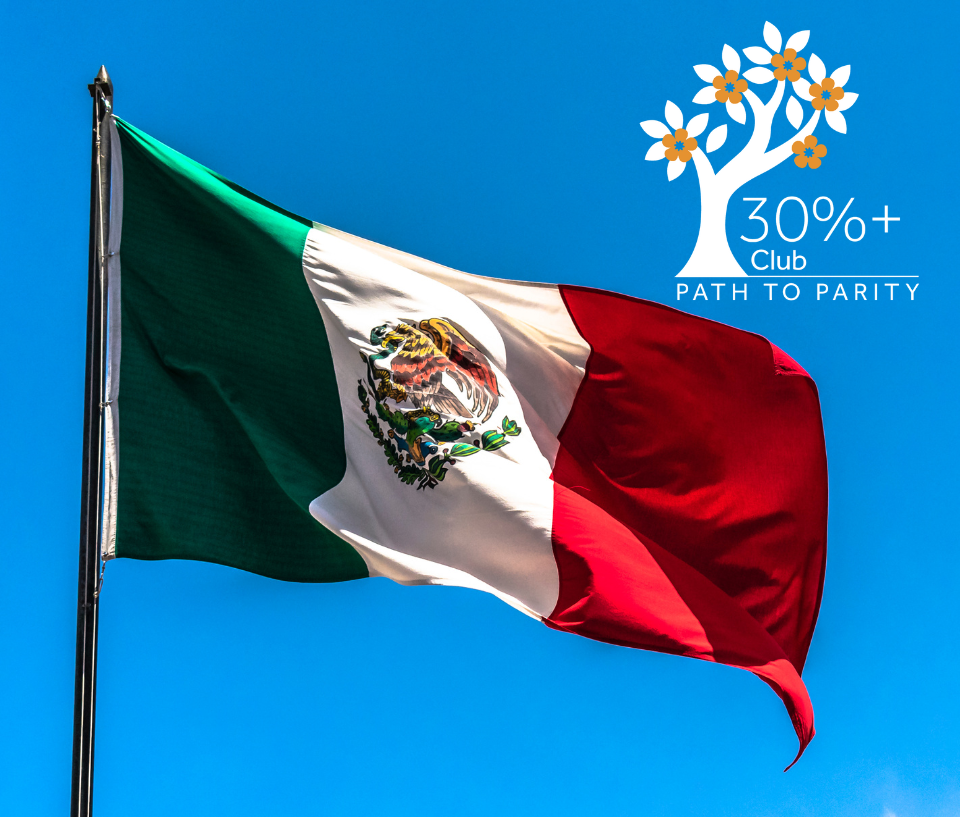Taoiseach Simon Harris joins 30% Club Ireland
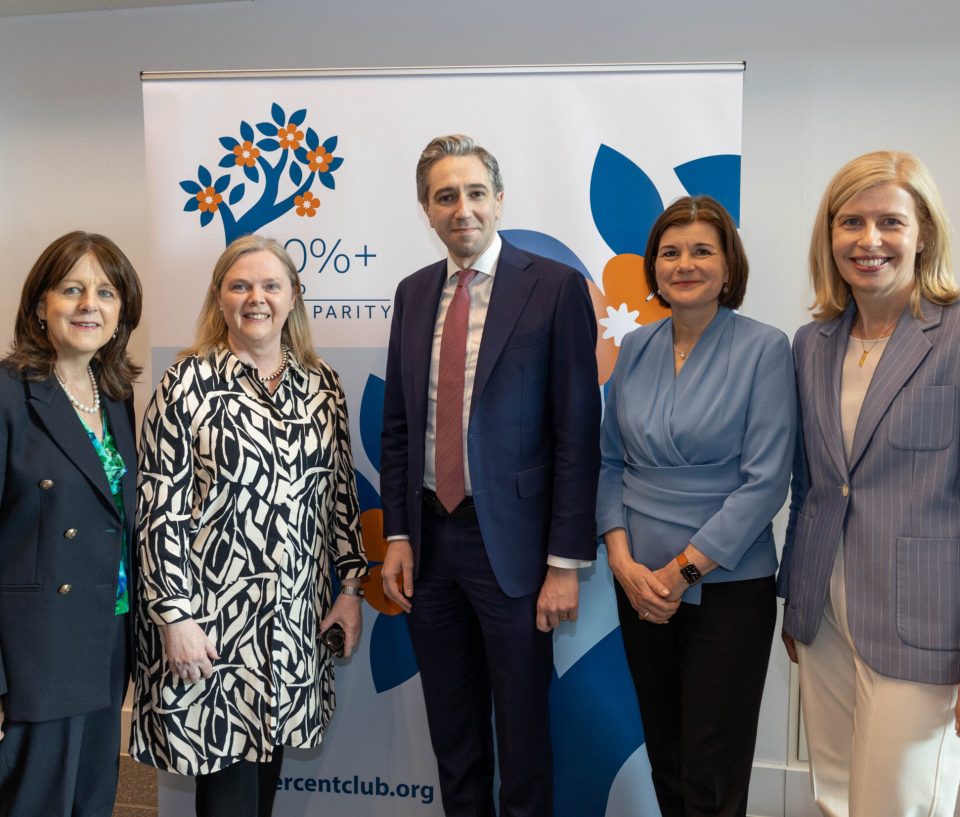
The new Irish Taoiseach Simon Harris joined the 30% Club Ireland’s 10th Chair and CEO conference in Dublin today.
Demonstrating his commitment to gender equality in business leadership, Simon showed up as a male ally to our cause.
He joined a large gathering of CEOs and chairs from 30% Club Ireland’s member companies, who represent over 650,000 employees across Ireland. These include both the private, publicly listed, and public service sectors.
The 30% Club is a global campaign supported by Board Chairs and CEOs of medium and large organisations, committed to achieving better gender balance at leadership levels and throughout their organisations, for better business outcomes.
Since it was established in Ireland ten years ago , the gender balance on Irish listed boards (ISEQ20) has more than trebled – from 12.5% then, to 40% today.
Gender Power Gap
One of this year’s themes looks at how companies can address the gender power gap that still exists within many Irish businesses and organisation. This is defined as the proportional power held by women in leadership and management positions, relative to men, which is often defined by historical stereotypes, with human resources as an example. The measurement differs from gender diversity, which only measures the presence of women at the top table, and the gender pay gap, which measures the average difference in remuneration.
As an example, only 25.7% of CFO roles are currently held by women, and this has decreased from 29.7% in 2019, CSO data shows. With CFO roles as important talent pipeline for Chair and CEO roles, addressing this imbalance becomes critical in modern succession planning. Achieving gender power balance is one of the topics that will be discussed by two panels, which will mark the successful progress across Irish business in the 10 years to date and consider where to next.
Panellists include: Myles O’Grady, Bank of Ireland chief executive; Eamonn Sinnott, Interim Head, Intel, Magdeburg, Germany; Carol Andrews, Co-chair Balance for Better Business; Lorna Conn, Cpl chief executive; Hanneke Smits Global Chair 30% Club and Global Head of Investment Management, BNY Mellon, Paddy Hayes, ESB chief executive and Michael Jackson, Managing Partner, Matheson.
Taoiseach Simon Harris told the audience of almost 300 that all women and men in Ireland should have equal access to opportunity, and that Ireland can be exemplary leaders in achieving full gender balance on boards and senior leadership teams, where our publicly listed companies have already exceeded the 33% quota set by the EU Women on Boards directive.
“I’m delighted to join leaders from across the private and public sector to support the important work of the 30% Club. Ireland has a huge pool of talent, and experience, so there is no reason why we cannot ensure boards and senior teams are gender balanced,” he said.
“The Ireland we live in must be reflected across business and wider society, because decisions that can embrace a wide spectrum of viewpoints will be the most informed ones. We have made significant progress to date but there is still a long way to go. I urge all business leaders to embrace gender balance, along with diversity and inclusion. It makes business stronger
Meliosa O’Caoimh, Outgoing Chair of 30% Club Ireland and Northern Trust Ireland Country Head, said what was important from her perspective is continuing the focus on all women.
“Gender is a majority not a minority issue, and a clear focus is still needed. This includes encouraging next generation talent and putting a particular focus on incorporating a regional view in our work. What has been achieved over the last decade in Ireland is fantastic, but we know there is still more to be done to maintain, and advance momentum, for better business outcomes.”
International trends and the likely challenges and hurdles of the next 10 years were also debated, along with examining where the future CEOs and Board chairs will come from, and how the power gap can be collectively closed. The panels also commented on the need to embed progress in every organisation, and not just rely on averages as a strong indicator. This is important in Ireland where CSO data shows that while we make progress on an average basis, 21% of C-suite teams still operate on an all-male basis.
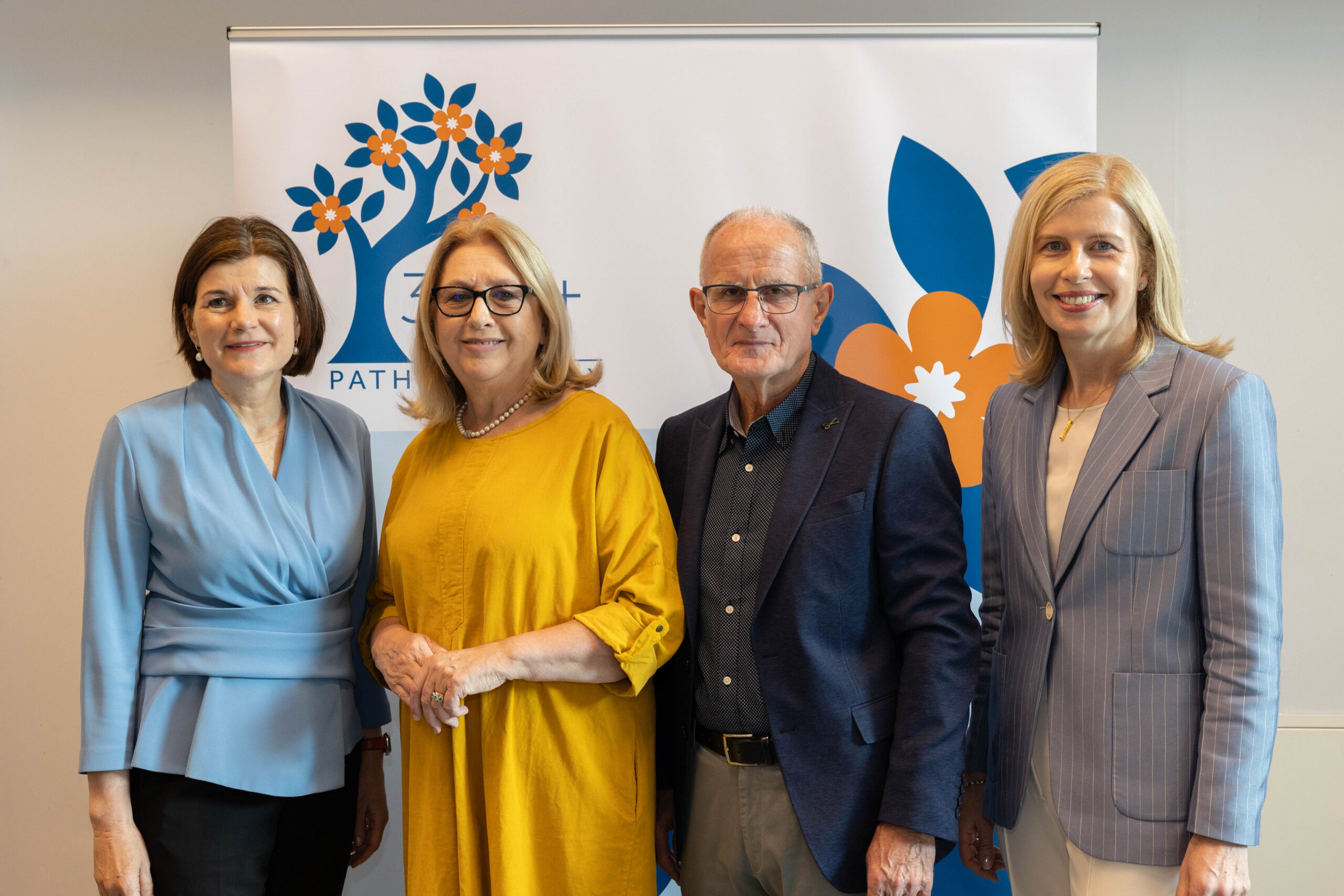
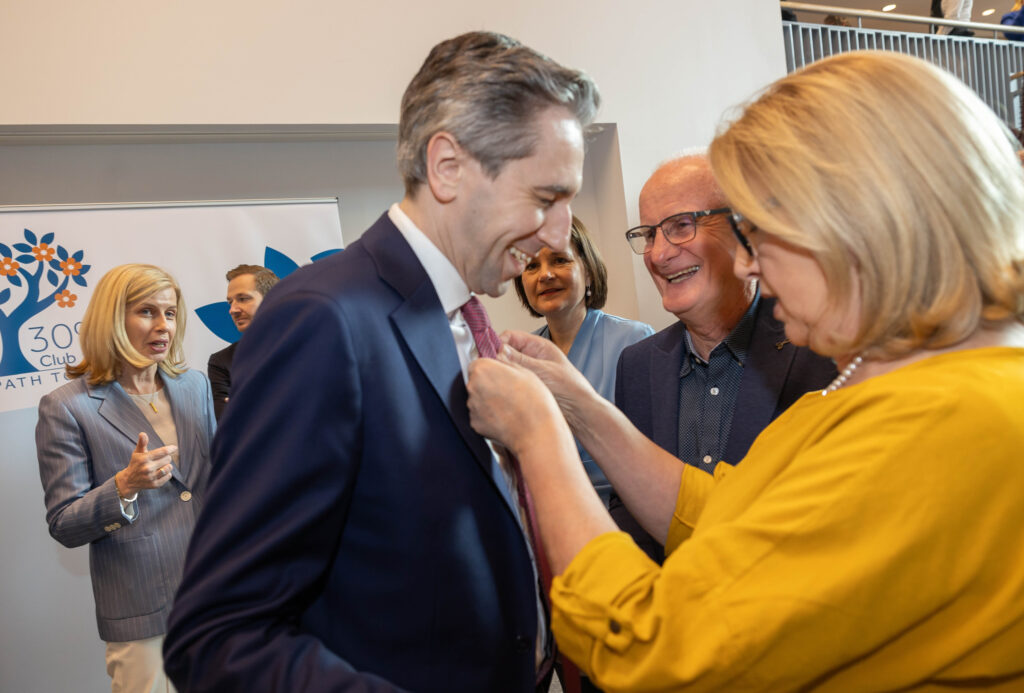
Paula Neary, incoming 30% Club Ireland Chair and a Senior Managing Director at Accenture, said her focus in the new role will be on how we “can use this moment as we redefine new flexible workplaces and new workforces augmented by AI, on changing the system, rather than the people”, and an
‘all gender’ agenda – versus a female agenda – that emphasises new ways of working that support men and women equally, to flourish and progress in modern careers.
“I am honoured and delighted to take over as chair of such an important initiative, which I have supported – and been part of – since its inception.
“If we are going to successfully drive and initiate more progress in this area, we need to look through a wider diverse lens, across society. That means thinking about how we engage everyone – especially younger men in the conversation on changing culture, behaviours and attitudes. Such a focus leads to better workplace outcomes for all talent – in terms of attraction and retention – and is critical to the economic success across Ireland.”
Green shoots of change in Australian boardrooms

In an increasingly complex environment post the global pandemic, boards are facing into new and interconnected landscapes.
There is the suite of digital trends, including AI, robotics and cyber security, more exacting customer expectations enabled by new digital fluencies, workforce transformations underpinned by hybrid ways of working, and the demand for reskilling and greater regulatory scrutiny.
This new reality prompted the 30%+ Club Australia and Deloitte Australia to investigate whether boards are future fit to manage risks and seize opportunities.
Having interviewed board members, executive search firms and investors, they challenged boards to consider complementing the traditional skillsets of governance, law and finance through the additional appointment of directors with diverse professional expertise in digital, marketing/customer and human capital.
Read the full report to find out more about Australia’s progress toward diversity in business leadership and 30% Club Australia’s work here.
Where we are
The 30% Club has come a long way from when it was set up in the UK in 2010.We now span six continents and more than 20 countries. We’re actively expanding into more G20 countries
Gender gap widens across OECD to 13.5%

It will take over 50 years to close the gender pay gap across the OECD! That’s the finding of PwC‘s latest Women in Work report.
The average gender pay gap across the OECD stood at 13.5% in 2022, having widened from 13.2% in 2021.
Luxembourg tops the index with a gap of -0.2%.
Australia demonstrated the best annual improvement, closing its gap by four percentage points to 9.9% and moving up to 10th place in the index.
The UK reported the largest slide of any OECD country, dropping from 13th place in on the index in 2021 to 17th in 2022 with a gap of 114.5%.
Read the full report here.
Where we are
The 30% Club has come a long way from when it was set up in the UK in 2010.We now span six continents and more than 20 countries. We’re actively expanding into more G20 countries
UK FTSE 100 reach 30% women on ExCos

The UK’s top 100 ranked companies have reached the critical mass of 30% women in executive committees for the first time.
The FTSE Women Leaders Review has also confirmed women hold 35% of all leadership roles in FTSE 350 companies and 42% of board seats.
However, despite much welcomed progress for female representation, there remains an absence of women leading the UK’s largest organisations. And almost half of all available appointments now need to go to a woman to meet the Review’s 40% Women in Leadership target by the end of 2025.
Pavita Cooper, UK Chair of the 30% Club, said: “Organisations need to double down on efforts to accelerate the progression of women through the pipeline. CEOs and Chairs need to drive the focus on closing this gap, failing to do so is simply bad for business.”
Read the full report here.
Where we are
The 30% Club has come a long way from when it was set up in the UK in 2010.We now span six continents and more than 20 countries. We’re actively expanding into more G20 countries

Australia’s top 20 companies hit 40% women on board

Australia’s top 20 ranked companies made history this quarter (Q2 2023) achieving an aggregate 40 per cent women on their boards.
This success reflects the long-term efforts of chairs, boards, regulators, investors, executive search firms and campaigns like the 30% Club Australia that have ensured continued stakeholder scrutiny of appointments to listed boards.
Of course, the aggregate figures do not tell the whole story. Across the 759 directorships currently held by women in the ASX 300, an overwhelming number are non-executive directors (685) while just 37 are executive or managing directors including CEOs, and only 37 are chairs.
Read the full report to find out more about Australia’s progress toward gender equality in business leadership and 30% Club Australia’s work here.
Where we are
The 30% Club has come a long way from when it was set up in the UK in 2010.We now span six continents and more than 20 countries. We’re actively expanding into more G20 countries

Gender balance almost achieved for ethnic minority directors

Across the FTSE 350, the numbers of ethnic minority directors are currently balanced almost equally between men and women, with 48% being women (47% in the FTSE 100, 48% in the FTSE 250).
The data emerged today from the latest update on the Parker Review – the business-led, UK government backed initiative that sets voluntary race equity targets for Britain PLC.
The 30% Club is proud to support the Parker Review with our own targets for the FTSE 350 to have at least one ethnic minority director or member of the executive committee by the end of 2023 and for half of those newly created seats to go to women of colour.
Today’s update also confirmed that 96 of the FTSE 100 had at least one ethnic minority director by the end of December 2022, up from 47% in 2016 and largely meeting the Parker Review’s initial target for Britain’s biggest companies.
Of course, a single ethnic minority director is just the start of the change we need to see and so it was encouraging to see that half of those FTSE 100 companies actually had more than one ethnic minority director by the end of last year.
But as we have seen in the gender diversity space, there is still so much to be done if true equity is to be achieved.
It remains the case that the vast majority of ethnic minority directors occupy non-executive roles. In the FTSE 100, for example, while the data revealed ethnic minority directors now account for 18% of all directorships, just six ethnic minority directors held a chair position, only seven were CEOs and nine were CFOs.
However, there are many practical things company leaders can do to bring about change from collecting more and better data to taking part in reverse mentoring.
For example, the 30% Club is helping organisations build on their commitment to race equity with our Leaders for Race Equity programme, run in partnership with the CBI’s Change the Race Ratio and Moving Ahead.
We match CEOs with ethnic minority executives from outside their organisations to learn from each other’s experiences and challenges while also attending working groups with their HR and D&I leads on topics ranging from data to AI to inform and improve corporate action on race equity.
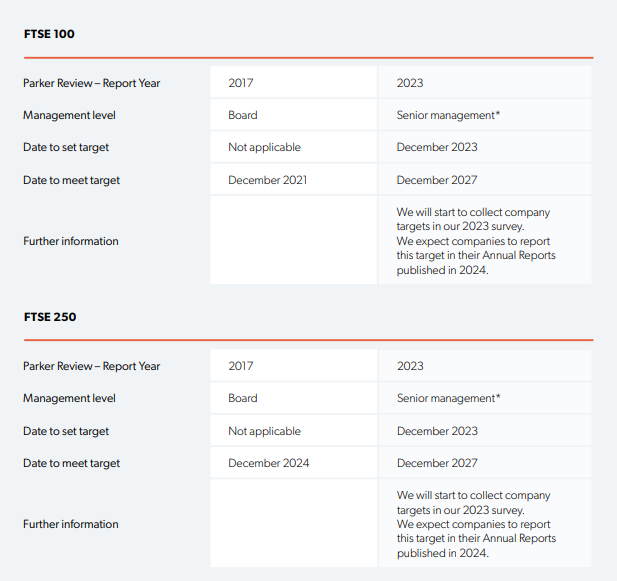
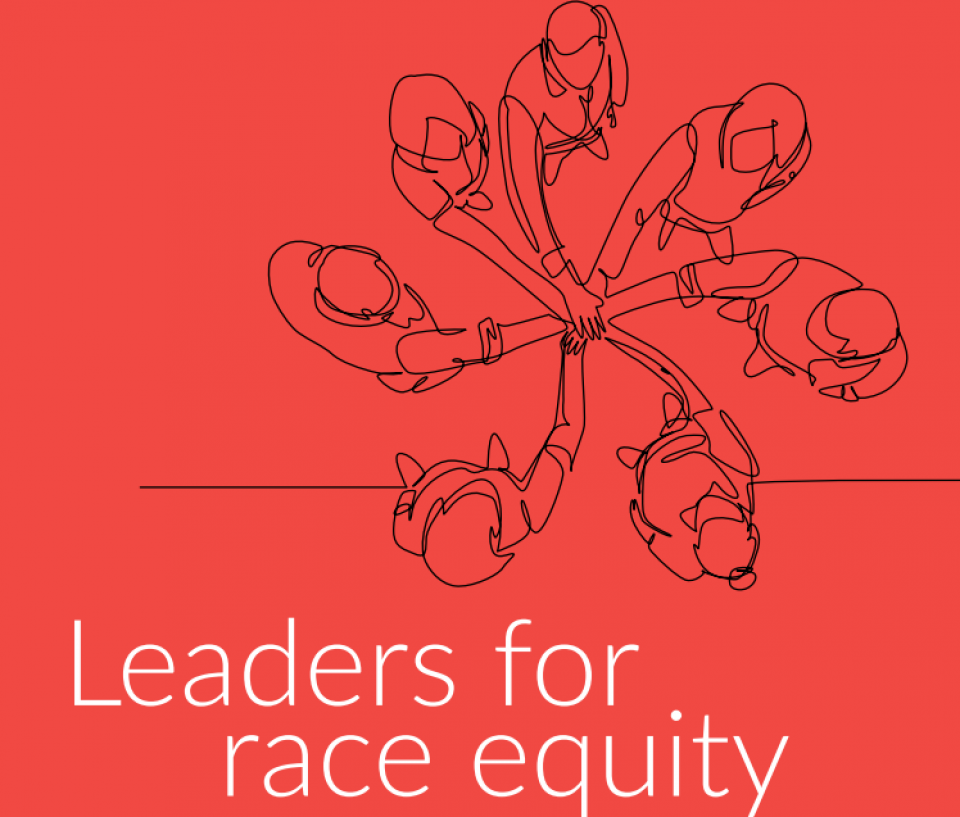
The Parker Review has set new targets for December 2027:
- – Each FTSE 350 company will be asked to set a percentage target for senior management positions that will be occupied by ethnic minority executives in December 2027
- – 50 of the UK’s largest private companies have been set the target of having at least one ethnic minority director on the main board by December 2027.
- – Each company will also be asked to set a target for the percentage of ethnic minority executives within its senior management team
You can read more about the targets and access the rest of the Parker Review data by clicking the box below.
Where we are
The 30% Club has come a long way from when it was set up in the UK in 2010.We now span six continents and more than 20 countries. We’re actively expanding into more G20 countries

Gender-balanced boards more likely to push for better company culture
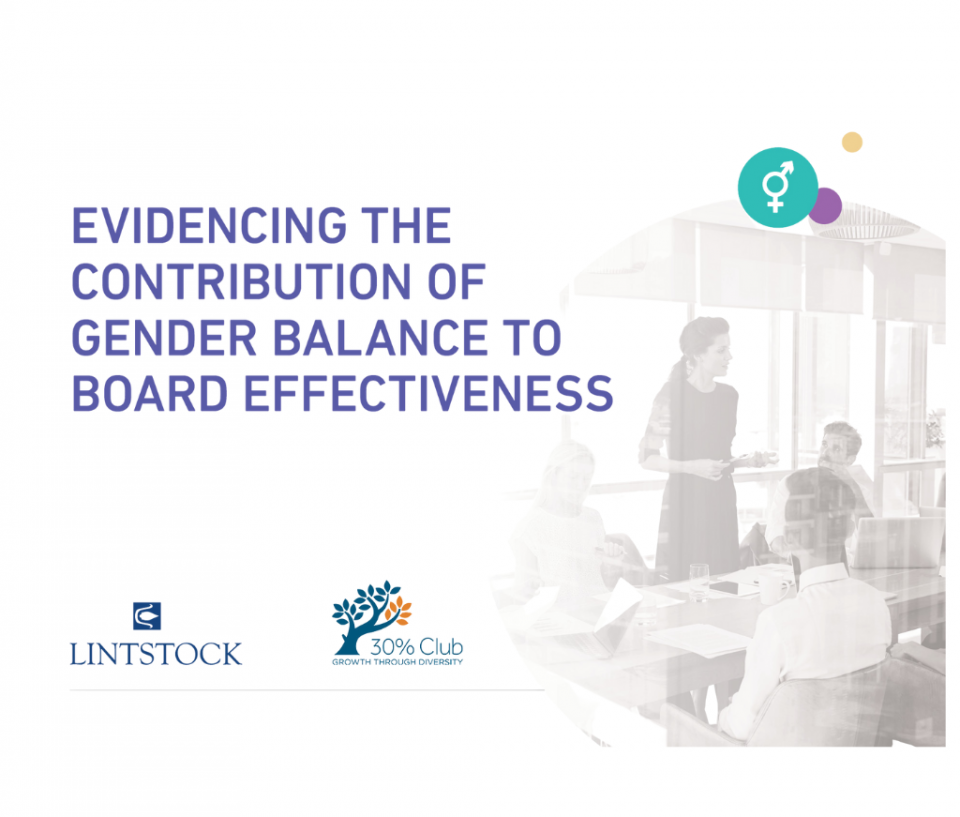
What diversity delivers
The 30% Club, in partnership with board advisory specialists Lintstock, has today issued new qualitative analysis based on the engagement of male and female directors in 100 FTSE board reviews in a report titled Evidencing the Contribution of Gender Balance to Board Effectiveness.
The survey showcases the difference gender diversity makes to the running of corporate boards, with a significant finding that women are more likely than men to focus on emerging issues, notably company culture and employee development.
In addition, female directors were also more likely to offer criticism and recommendations for improvement on both their own performance and their business activities.
The past twenty years have irrevocably changed the way businesses think about board composition and the impact this has on decision-making, with a push for greater gender diversity at the forefront of this shift in perception.
Through examining the engagement of male and female directors in board reviews, this study illustrates how gender diversity contributes positively to board performance. The findings show that gender balance is no longer a question of fairness, but that of effectiveness.
Despite the increased focus on ethnic diversity, the analysis highlights there have yet to be any examples of boards truly grappling with diversity in its wider forms, with some mismatches occurring between diversity ambitions and boards’ actions.
By demonstrating the link between diversity and effective oversight, we hope that this study will renew the impetus of boards to go beyond the traditional candidate pool, to secure directors with a broader set of skills and backgrounds.
Other key findings…
- – Female directors are more likely to identify the need for further board diversity in areas such as age, culture and social background
- – Women are three times more likely to recommend greater ethnic diversity than their male colleagues
- – Women engaged heavily on employee sentiment and culture and were over 50% more likely to serve as a designated non-executive director for engaging with the workforce – the most frequently adopted employee engagement mechanism
- – Women were 50% more inclined to raise ESG performance as an area for improvement.
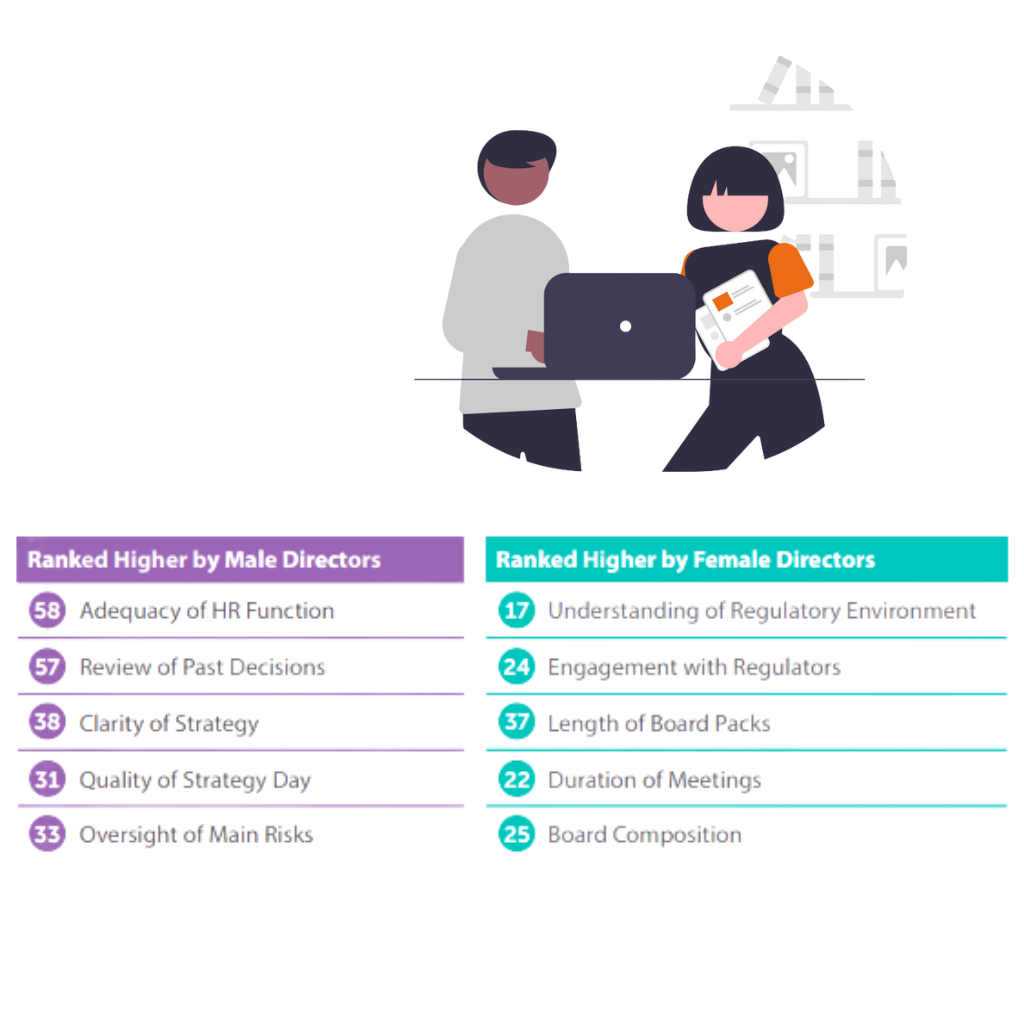
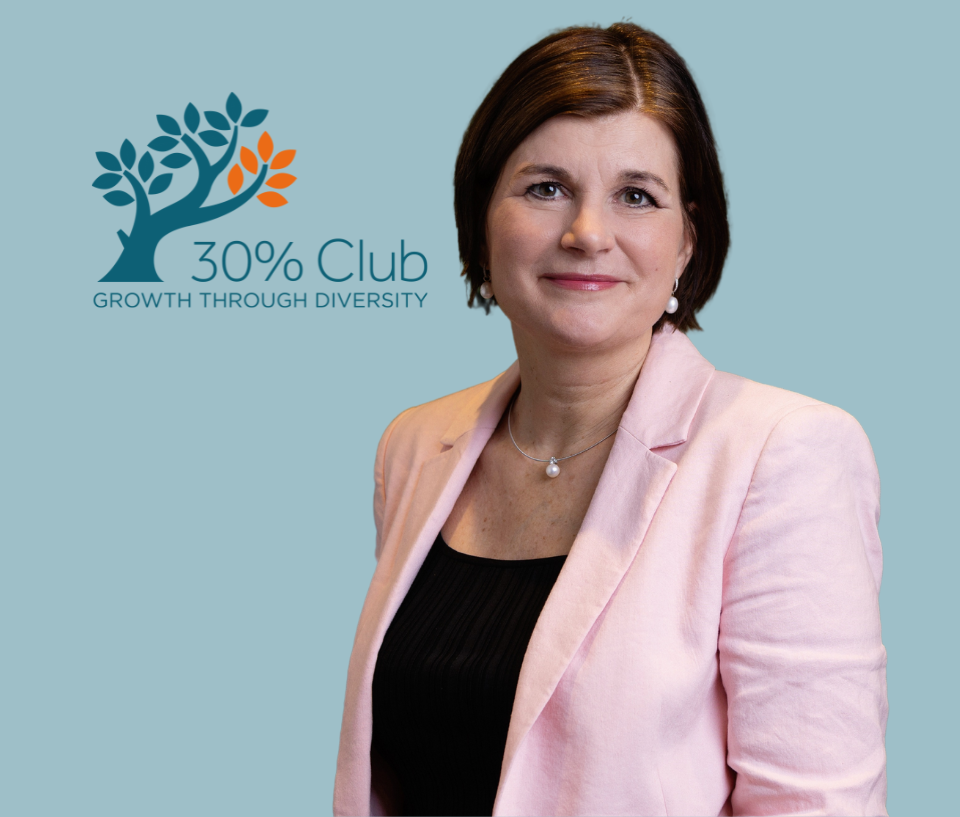
Hanneke Smits, global chair of the 30% Club and CEO of BNY Investment Management, said: “The findings further confirm that a more gender diverse group of board members will consider a greater variety of issues and ask a wider range of questions. Of particular importance in the report is the evidence that female board directors place a greater priority on hiring diverse teams and therefore increasing access to a broader pool of skills and experience.
“Against the backdrop of a challenging macro and geopolitical environment, it’s critical that companies harness the power of diverse talent at all levels of their organisation to succeed. At the 30% Club our focus is unwavering: diversity must remain on the board agenda and there is genuine progress to ensure current, and future, executive leadership teams better represent the society we live in.”
Neil Alderton, a partner at Lintstock, said: “Oversight of employees was becoming a headline concern for boards even before the upheaval of COVID-19 and findings from our study reveals that female board members are more than twice as likely as their male counterparts to identify the need to focus on people development and improving the diversity of the workforce.
“Better gender balance is not only a question of fairness – our findings show that it is also a matter of effectiveness. We see that diversity of gender contributes to diversity of thought around a number of board performance areas, broadening boards’ horizons and bolstering the support and challenge that directors are able to provide as a collective.”
Investors given tool to boost gender equity in net zero race
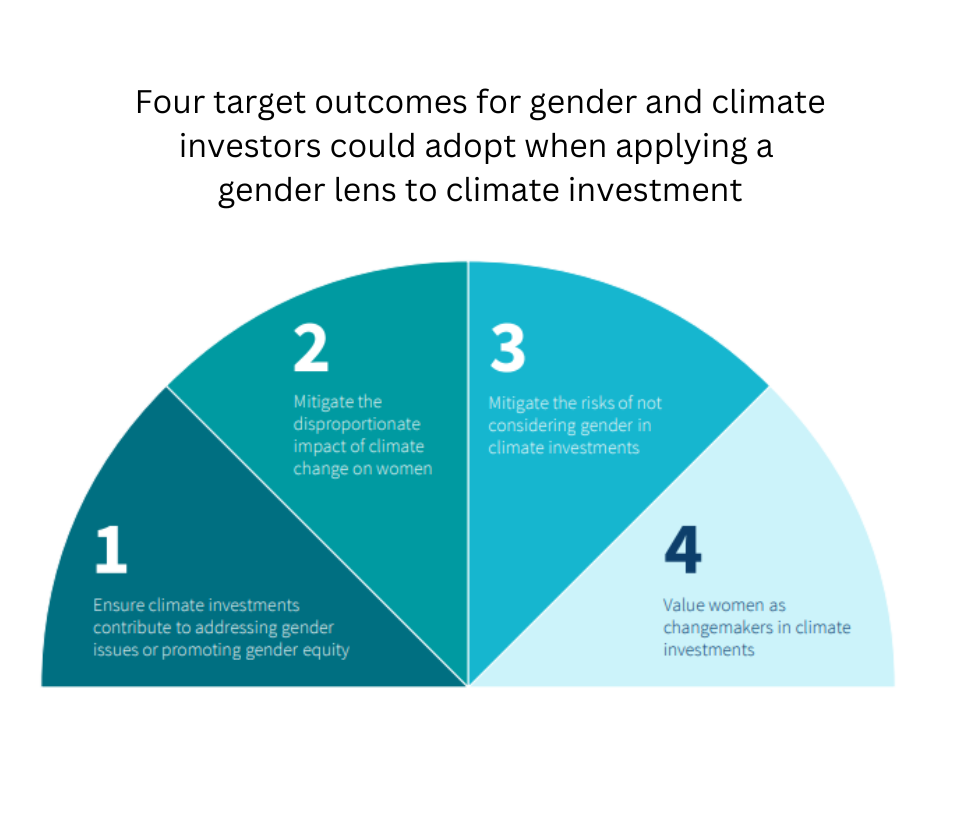
The Women in Finance Climate Action Group has developed a framework to help financial institutions support women in the net zero transition and limit the negative impact of climate change on women.
The 30% Club is delighted to support the rollout of this first-of-its-kind framework specifically for private investors and the key role they play in financing net zero.
Integrating a gender lens into climate investments is important to value women as key stakeholders in solutions, to ensure not only a better path, a more ‘Just Transition’, but also a shorter one, unleashing the potential of women as changemakers, in finance and in who and what is being financed.
Women remain under-represented in climate finance
The Women in Finance Climate Group argues that whilst climate change disproportionately impacts women, women remain seriously under-represented in climate policy, climate decision-making and climate finance.
The Action Framework, created in collaboration with the Oliver Wyman Forum and 2X Global, is available to download here.
The Women in Finance Climate Action Group comprises women leaders from business, the public sector and civil society and includes Tanya Steele, CEO of WWF-UK and Sarah Breeden, Executive Director at the Bank of England.
Amanda Blanc, Aviva’s Group CEO, said: “Private capital is key to mobilising the trillions of dollars required over the next three decades to limit warming to 1.5 degrees. And yet the global private finance sector does not currently have the tools or incentives in place to evaluate and improve the impact of climate finance on gender equality.
“We need more data to measure the impact of specific climate investments or project financing on women and girls. We hope this Framework will give financial institutions what they need to begin to measure and deliver greater gender equality when taking action on net zero.”
Rupal Kantaria, Partner, Oliver Wyman Forum and head of climate for the 30% Club, added: “This first-of-its-kind Action Framework for investors embeds gender considerations into climate investment decisions. Both are critical for financing a faster and more just climate transition.”
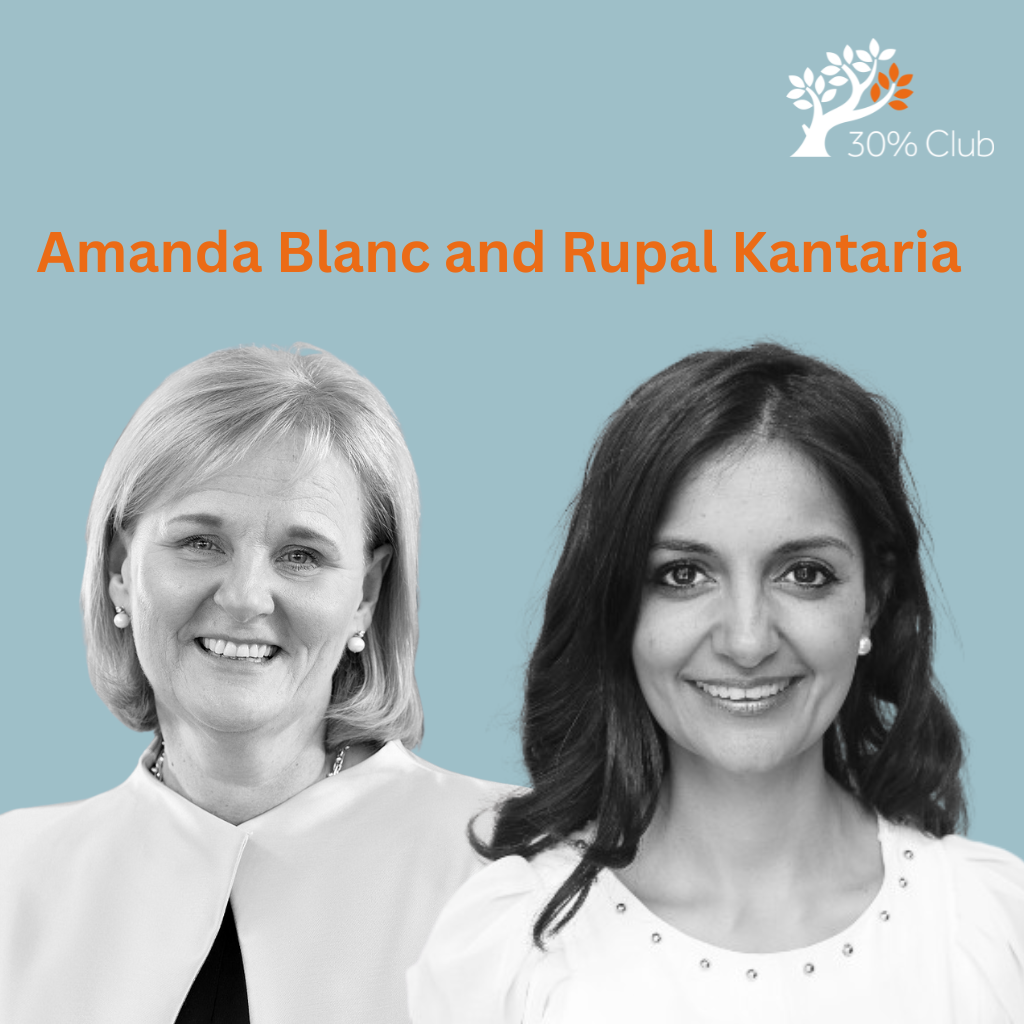
Where we are
The 30% Club has come a long way from when it was set up in the UK in 2010.We now span six continents and more than 20 countries. We’re actively expanding into more G20 countries

More women rising to the top in France across the SBF 120
Paris, 16 January 2023. The 30% Club France Investor Group announces today the publication of its second annual report, revealing the latest trends and data on gender diversity at 120 companies part of the SBF 120 Index in France.
Launched in November 2020 by six French asset managers with the objective to promote better gender diversity within the SBF 120 companies’ executive management teams by 2025, the investor group has today 16 members representing over €6 trillion of assets under management, 5 having joined this year.
Core activity
In its second year of the campaign, the 30% Club France Investor Group conducted a wide variety of activities to engage with corporates, stakeholders, and experts, enabling the Club to develop key observations regarding gender diversity in France:
– Compared to last year, companies are both more open to engaging and more prepared. The refusal to engage is more the exception than the rule. However, the 30% Club France Investor Group faced some refusals under the pretext of “we already have 30% of women on our Executive Committee”, although the goal is to look beyond the percentage of women on that committee.
– Most companies are convinced of the value of gender diversity. A positive momentum has been emerging in the form of action plans and targeted goals. But these targets, as well as their scopes (i.e., the executive body targeted) and time horizons, lack homogeneity, making it difficult to work towards the goal of 30% female representation at the highest levels of management.
– Two opposite trends are coming into play. The COVID-19 crisis had a disproportionately negative impact on women in attracting, retaining, and promoting talent while the enforcement of the Rixain Law (1) acted as an accelerator of awareness for the importance of gender diversity. The issue is more acute in some sectors, particularly industrial and STEM activities, making the competition for attracting female talent more intense. The generalization of remote working may accentuate the recruitment problem for those companies where this will not be possible due to the nature of the jobs.
– Sectors with high female employment rates (i.e. Financial Services and Insurance, Consumers) still have obvious glass ceilings. While there are targets and strategies, these sectors have a long way to go and changed very little compared to last year.
– The notion of gender pay gap was discussed at length. There is some confusion between equal pay gap and gender pay gap. Closing the gender pay gap requires measures to break the glass ceiling through adequate, supportive, and relevant HR policies.
Building on a strong foundation
Continuing the efforts from 2021, the 30% Club France Investor Group collaborated with policymakers and experts seeking to address the secular question of gender diversity.
As chair of the 30% Club France Investor Group for the 2022 engagement season, Marie-Sybille Connan from Allianz Global Investors declares: “the 30% Club France Investor Group has a solid foundation to lead into year three of the group. Our roadmap for 2023 is set and articulated around:
– Moving the needle further and continuing to engage with SBF120 constituents
– Collaborating with Mercer on their Global Talent Trends survey including gender diversity practices to get more consistent and actionable data
– Advocating for the creation of the CEO & Chair pillar to have a complete 30% Club Chapter in France. France is the latest country where an investor group has been established but still needs the CEO & Chair pillar that will be instrumental in driving awareness on gender diversity in the corporate world. We invite any CEO or Chair who wants to act and drive gender equality to reach out to us.”
New leadership structure
In order to ensure proper onboarding and transfer in knowledge among members, the 30% Club France Investor Group is implementing a co-chairing of the initiative over a two-year mandate.
In 2023, Candriam AM will be co-chairing the 30% Club France Investor Group alongside Allianz Global Investor.
Theany Bazet, Co-Chair of the 30% Club France Investor Group and Fund Manager at Candriam, said: “I am honoured to join Marie-Sybille as Co-Chair to continue building bridges with corporations via active engagement and constructive dialogue together with our community of 16 responsible engaged investors.
“It is only by sharing best practices and bringing to light any issues that we can advance gender diversity and drive systemic change.
“We will notably thrive to developing the CEO/Chair pillar of the 30% campaign to have in France a full 30% chapter.
“Doing so will strengthen the commitment of improving gender diversity in the higher ranks of companies and increase the chances of success.”
The full report, including key figures, case studies and the KPIs list, is available here.
ENDS
Notes to editors
[1] On December 24, 2021, France adopted a new law to promote gender equality in the workplace and in the economy at large. This law, referred to as the Loi Rixain (Rixain Law), after the bill’s main sponsor in the French parliament, Marie-Pierre Rixain, imposes quotas for the representation of women in the leadership positions of large corporations, defined as corporations of 1,000 or more employees. By March 1, 2027, at least 30% of managerial positions in these companies, as well as 30% of the seats on these corporations’ governing bodies, will have to be filled by women. By March 1, 2030, these quotas will be raised to 40% for both managerial positions and governing bodies.
About the 30% Club France Investor Group
The 30% Club is a global campaign taking action to increase gender diversity at board and senior management levels. In 2010, the campaign was launched in the UK and it now has chapters around the world, with some backed by dedicated investor groups. In November 2020, six investment institutions decided to create an investor group in France.
The 30% Club France Investor Group now includes 16 members representing around €6 trillion AUM. Its focus is to engage with the investee companies and push for at least 30% of executive committee seats to be filled with women by 2025. It also aims to increase disclosure expectations around the topic of gender diversity. The group believes gender balance on boards and senior management encourages better leadership and governance, diversity and inclusion contribute to all-round board performance and, ultimately, increase corporate performance for companies and their shareholders.
Contacts
Steele & Holt
Servane Taslé
+33 (0)6 66 58 84 28
servane@steeleandholt.com
Anais Miegeville
+33 (0) 6 33 73 85 16
Allianz Global Investors
Marion Leblanc-Wohrer
+33 (0) 1 73 05 77 91 / +33 (0) 6 85 15 74 54
Marion.LeblancWohrer@allianzgi.com
Candriam
Isabelle Lieven
+32 2 509 61 69
media_relations@candriam.com
Brain tumour survivor on why Mission Include mentoring is so important for her
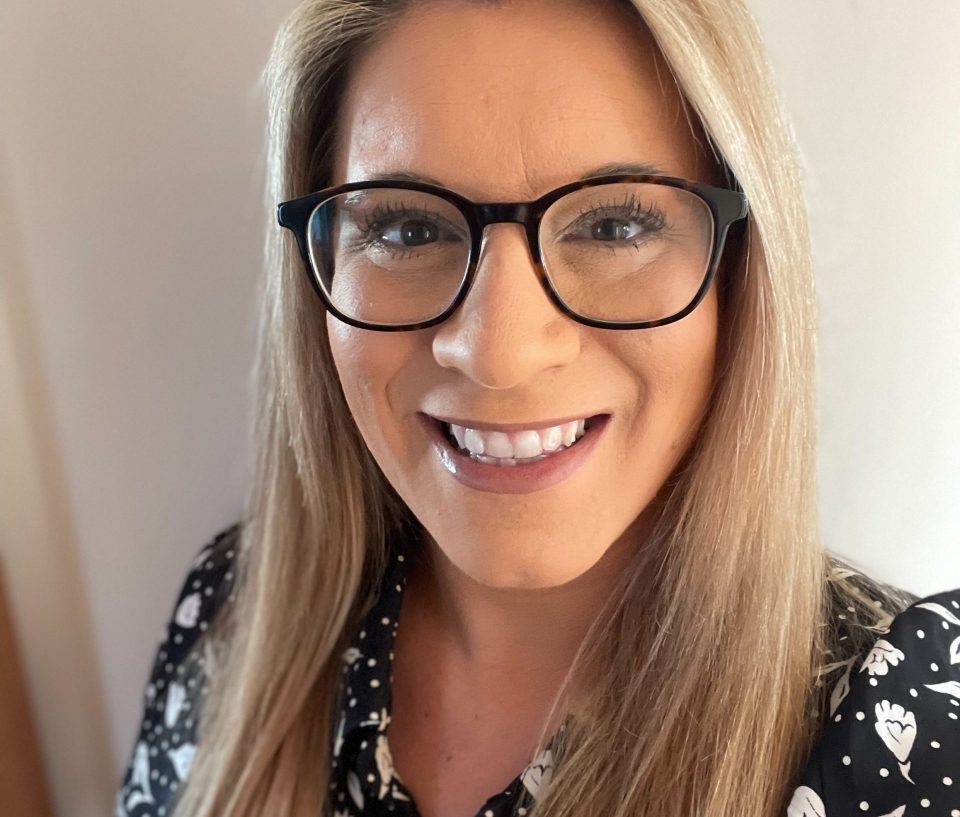
A year ago, commercial banker Jessica Jones underwent a life-saving operation to remove a brain tumour that left her unable to walk unassisted.
Since then, not only has the 38-year-old mum of three from Swansea returned to the job that she loves but she’s also embarking upon a journey of personal development by being mentored on the 30% Club cross-company mentoring programme Mission INCLUDE.
It was important to Jessica to explain this life-changing experience to her mentor at their first meeting in November. Her diagnosis 18 months earlier changed her outlook on life and her career and will be a big part of her mentoring journey.
At its core, Mission INCLUDE is a structured cross-company mentoring programme that expertly pairs senior business leaders with mentors outside of their industry to challenge and help them progress.
Jessica is a relationship director at NatWest with responsibility for financing SMEs with turnovers of up to £50 million. She has been paired with mentor Laura Pingree, a partner at accountancy firm BDO LLP, who specialises in energy and mining.
During their first meeting, Jessica revealed how the excitement of receiving a promotion in March 2020 was overshadowed, three months later, by the devastating news that she would require life-saving surgery.
“I didn’t want sympathy, but I wanted her to know the journey I’d been on and why I was so determined to get the most out of this experience,” she says.
Jessica explained to Laura that after suffering hearing loss, headaches and tinnitus since 2019, she saw her GP in June 2020, who prescribed migraine tablets. But when the symptoms didn’t improve after a couple of days, she was referred to hospital for a CT scan.
While waiting for that appointment, her blood pressure became abnormally high, so she attended Prince Phillip hospital in her hometown of Llanelli, Carmarthenshire. After two days of tests – and while sat alone due to Covid restrictions – Jessica was given the devastating news that she had an acoustic neuroma causing pressure on her brain stem.
“I was in total shock. Hearing those words, ‘you’ve got a brain tumour’ was terrifying. I was absolutely petrified and burst into tears,” says Jessica.
Backlogs caused by the pandemic meant she had to wait until January 2021 for surgery.
During a gruelling 13-hour operation, which involved removing a section of skull from behind Jessica’s ear, surgeons successfully removed most of the tumour. They advised to leave a small part of the tumour which had grown around the facial nerve, so not to cause facial palsy. The procedure has left her with single sided deafness and a CROS hearing aid.
She was kept in hospital for two weeks. Covid restrictions meant that Jessica’s husband Mark and their daughters Ella who is eight, and five-year-old twins Emily and Lily, couldn’t visit her.
“I was unable to stand the first few days without vomiting due to the vertigo, and each day challenged myself a little more. Thanks to the support of the team there, I finally left the hospital trundling along on a Zimmer frame at the age of 37,” she says. “When I was home, I paid for weekly sessions with a neuro-physio who helped me build the confidence and strength to walk without the frame.”
Her diagnosis left her fatigued and sometimes unable to walk more than 2,000 steps a day, but in September 2021, Jessica was keen to return to the job that she loves.

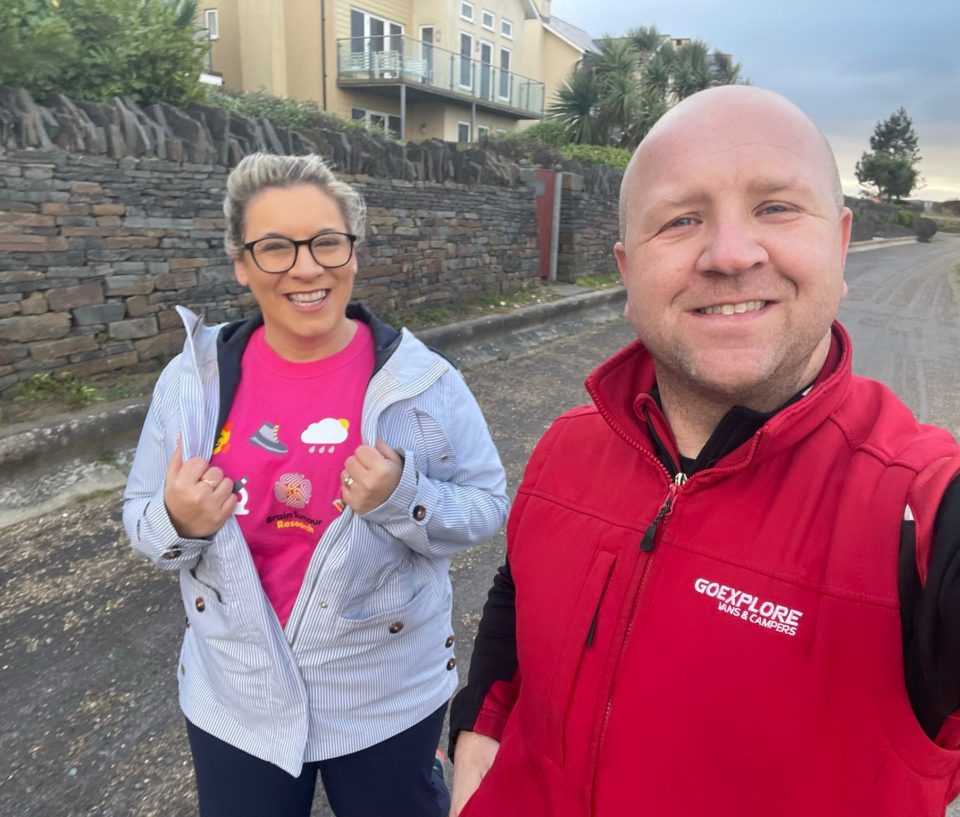
“Natwest has fully supported me since the moment I was diagnosed and on the path towards rehabilitation,” says Jessica. “We spoke about both my personal and career development and I explained that I thought that being mentored by someone outside of banking would help develop me as an individual. They recognised what I had been through – and the journey that still lies ahead – and I’m grateful they gave me special approval to take part in Mission INCLUDE.
“In the 14 years I’ve worked for NatWest, I’d previously been on excellent courses that were bank focused and I have always been very passionate and committed in taking responsibility for my career progression. I knew that I would benefit from having an outside mentor challenge me, hold me accountable and offer external perspective on my development.”
Jessica admits she was initially surprised by who she was paired with.
“When I first read Laura’s profile, I was unsure as to why we’d been put together as our experience looks so different on paper. But I soon realised we are so well matched. Our personalities are very, very different but whatever algorithms Moving Ahead use to match people, it definitely works!
“We are very open with each other about our lives and our experiences. You need that openness, otherwise the mentoring would be very scripted.”
At their most recent meeting in January, Laura challenged Jessica to apply to sit on a non-executive board during the nine-month programme – something that would help give her exposure to other business issues that could be of use to her in NatWest.
In preparation, she’s also been tasked with gathering 360° feedback from colleagues to see if the areas that Jessica thinks that she needs to develop align with those they suggest.
“I questioned who would want me on their board, but by sharing her own experiences, Laura was able to reassure me that I have transferable skills and that businesses in sectors outside of banking – and outside of my comfort zone – would welcome,” she says. “And I now realise the experience would greatly aid me in my development within NatWest.”
Aside from the one-to-one mentoring, Mission INCLUDE offers other benefits.
“The programme includes regular Zoom events with participants from around the world, masterclasses to get the best out your development, networking sessions with other mentees, and the opportunity to hear from fantastic, thought-provoking expert speakers,” she says.
A recent talk by coach Holiday Phillips on pushing yourself outside of your comfort zone resonated with her.
“On Christmas Eve, I received the news that the remainder of my tumour is stable and I’ll have yearly scans to monitor what is left of it,” she says. “Having the tumour has taught me is life is too short to be taken for granted and to keep pushing yourself, developing and reflecting. Sometimes that means doing things that you’re a little uncomfortable with, but you may never get the opportunity to do again if you don’t do them now. I want to push myself and do things that perhaps make me feel a little bit uncomfortable.”
Jessica can already see the benefits that the Mission INCLUDE programme will bring to her and NatWest.
“I am already learning lots that I can apply to my current role and future development. Having a mentor share their expertise and encouragement will also help equip me with new skills that I can bring to the bank to assist others,” she says.
And it’s not only at the bank that that Jessica wants to help others. Last month, she embarked on an ambitious 10,000 Steps a Day challenge to fundraise and raise awareness for Brain Tumour Research to help find a cure for the devastating disease as a way of thanking all those who helped her. She raised more than £2,500. If you would like to donate, click here for more information.

Where we are
The 30% Club has come a long way from when it was set up in the UK in 2010.We now span six continents and more than 20 countries. We’re actively expanding into more G20 countries

A Tribute to the Trailblazers – Watch Our 15-Year Celebration Film
Looking Back with Pride. Looking Ahead with Purpose.
To mark the 15th anniversary of the 30% Club UK, we created a special video tribute – not only to commemorate how far we’ve come, but to honour the people who made it possible.
Premiered at our celebration evening at Claridge’s, this film is a heartfelt look back at the beginnings of the 30% Club. You’ll hear from founding Chairs, Steering Committee members, and passionate supporters who reflect on what it took to turn the 30% Club into a global movement.
Fifteen years ago, saying “we need more women on boards” was provocative. Today, it’s widely accepted. But that transformation didn’t happen overnight. It happened because individuals were willing to speak up, challenge norms, and put inclusion at the top of the business agenda.
This video is our tribute to the many who took that first step:
The founders who put their names – and reputations – on the line.
The Chairs and CEOs who signed up and opened boardroom doors.
The advocates and volunteers who built momentum on the ground.
And the next generation of leaders, already making their mark.
As we look to the future, our focus is shifting towards the executive pipeline – supporting women not only to join the boardroom but to lead it. Representation at ExCo -1 and -2 is the next frontier, and we’re committed to unlocking those leadership pathways.
Thank you to everyone who has supported us across the past 15 years – and to those joining us for the next 15.
Celebrating 15 Years of Progress on the Path to Parity
Earlier this month, we marked a powerful milestone in our journey – 15 years since the 30% Club first launched in the UK. What began as a bold challenge to the status quo has become a global movement, transforming boardrooms and reshaping the leadership landscape.
Hosted at the iconic Claridge’s Hotel in London, our anniversary celebration brought together long-time allies, founding members, and future changemakers. It was a night to recognise just how far we’ve come – and to recommit to the work still ahead.
When the 30% Club launched in 2010, women held just 12.5% of seats on FTSE 100 boards. Today, that figure stands at an impressive 44.7%. That shift didn’t happen by accident. It’s the result of sustained, collective action – and a community of leaders, both men and women, who understand that diversity at the top isn’t a “nice to have” but a business imperative.
During the evening our UK Chair Pavita Cooper gave a powerful speech reflecting on Club’s origins and how far we have come. We also heard from Rupal Kantaria, UK Vice Chair, who laid out our vision for the future – including a focused effort on building a stronger female CEO pipeline.
We were also delighted to show a special video address from Rt Hon Rachel Reeves, UK Chancellor of the Exchequer, who highlighted the economic and societal impact of more inclusive leadership. Speeches were closed by our sponsor Malik Karim, CEO of Fenchurch Advisory Partners, who made the evening possible, and whose continued support for gender parity in leadership exemplifies true allyship.
We are proud of the 21 international chapters, 1,800 member organisations, 31 scholarships for young women, and the world’s largest cross-company mentoring programme – all of which have grown from this shared commitment to progress.
As Pavita noted on the night: “We owe a debt of gratitude to those who stuck their necks out early, and to everyone who’s kept pushing forward on the #PathToParity.”
Thank you to everyone who has walked this journey with us. Here’s to continuing to break down barriers and building a future where every woman has the opportunity to lead.
15 Years of Impact: The 30% Club’s Journey
From 12.5% to 44.7% – How a Bold Idea Sparked a Global Movement
When the 30% Club launched in 2010, just 12.5% of FTSE 100 board seats were held by women. That stark imbalance sparked the formation of a movement that set out to change the face of leadership, not just in the UK, but around the world.
Our new timeline marks the key milestones and turning points over the past 15 years, offering a visual reminder of what sustained advocacy, collaboration and courage can achieve. Click here to view the PDF in detail.
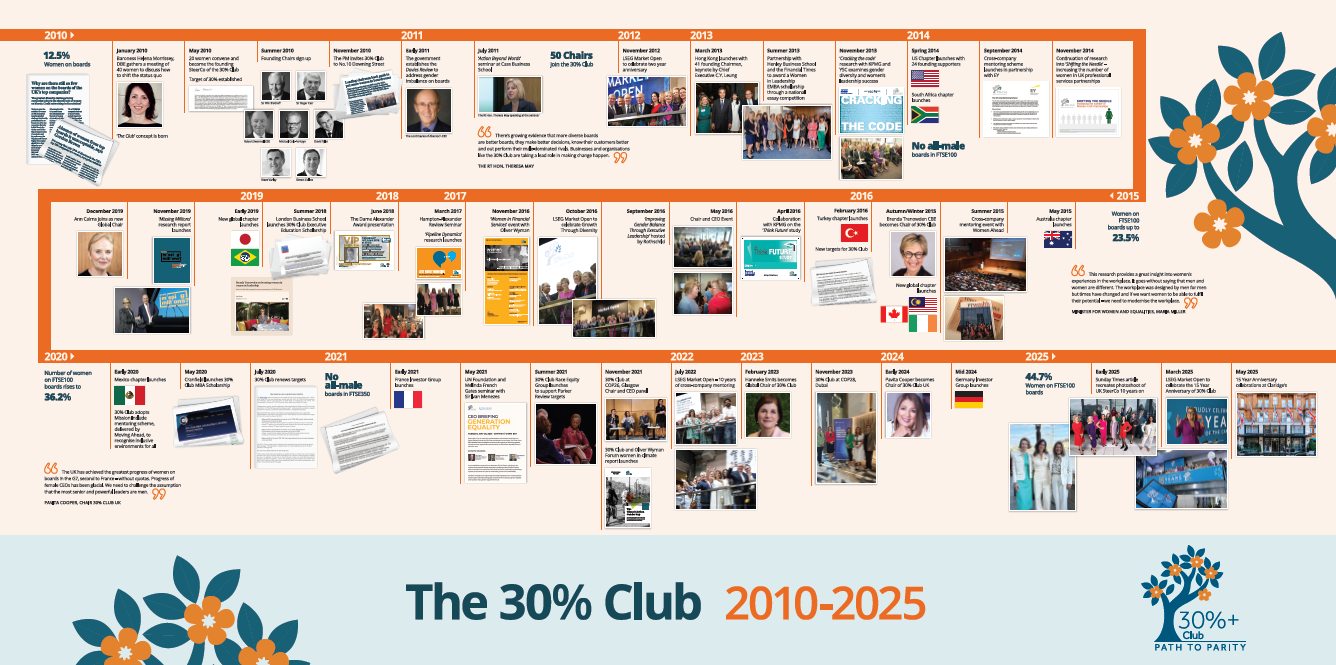
The Early Days (2010–2012)
The concept for the 30% Club was born in early 2010 when there were just 12.5% of women on FTSE 100 boards. Founding Chair Helena Morrissey brought together high-profile Chairs and CEOs who were willing to challenge the status quo, and a dedicated group of women to make up the first 30% Club SteerCo.
By 2012, the number of Chairs signing up to the 30% Club had grown to 50 – proving change was not only necessary, but possible.
Momentum Builds (2013–2016)
The 30% Club went global, with the 30% Club Hong Kong chapter launch. The club also turned its vision towards the pipeline and executive education with the launch of our first scholarship programme, in partnership with Henley Business School and the FT.
The UK saw a significant rise in women on boards during this time period, supported by initiatives like the “Cracking the Code” report and further international expansion into the US, Southern Africa, Ireland, Japan, Australia, Turkey, Canada, Ecuador and Malaysia.
By 2015, the percentage of women on UK boards had risen to 23.5%.
Making progress (2017–2020)
Research reports, mentoring initiatives, more scholarship programmes and CEO campaigns drove deeper change. The percentage of women on UK FTSE 100 boards rose to 36.2%
Accelerating Impact (2021–2024)
The Club hit a landmark moment – there were no all-male boards left in the FTSE 100. During these years, new campaigns, data releases and Chair-led working groups focused on building the pipeline of future leaders.
By the end of 2024, women made up 44.7% of FTSE 100 board roles, and the conversation has now shifted to how we can improve the number of women in executive leadership positions – to date only 9% of FTSE 100 companies have a woman in the CEO position.
2025 and Beyond: The Work Continues
Our focus in the UK now extends to the executive pipeline – ensuring women are not only present, but poised to lead at every level. As we head towards our 16th year, we’re doubling down on our mission to make inclusive leadership the norm, not the exception.
„Women Go Boards” na Perspektywy Women in Tech
Za nami wydarzenie „Women Go Boards” podczas pierwszego dnia Perspektywy Women in Tech, które zgodnie z tegorocznym hasłem pokazało siłę współpracy kilku instytucji:
- 30% Club Poland
- European Women on Boards, instytucja wspierająca 30% Club Poland
- Benefit Systems, firma członkowska 30% Club Poland
- Stowarzyszenie Niezależnych Członków Rad Nadzorczych
Wydarzenie rozpoczęły:
- Katarzyna Piasecki, ambasadorka 30% Club Poland, przedsiębiorczyni & inwestorka, założycielka ENNBOW i dyrektor zarządzająca @European Women In VC,
- Małgorzata Żelazko, Dyrektor IR i FP&A w Grupa Wirtualna Polska, firmie członkowskiej 30% Club Poland, członkini Komitetu Sterującego 30% Club Poland,
- Ewa Kubín, Country Lead European Women on Boards,
przedstawiając poszczególne instytucje.
Następnie w panelu dyskusyjnym prowadzonym Milenę Olszewską-Miszuris, Co-Chair 30% Club Poland:
- Dr Patricia Gestoso – znawczyni technologii, doradczyni, Country Lead EWOB UK
- Klaudia Gorczyca – przedsiębiorczyni i doradczyni władz spółek
- Aniela Hejnowska – niezależna członkini rady nadzorczej Benefit Systems
- Robert T. Nowakowski – kierujący biurem Spencer Stuart w Polsce
- Przemysław Aleksander Schmidt – niezależny członek rad nadzorczych, Stowarzyszenie Niezależnych Członków Rad Nadzorczych
- Olga Surugiu – CEO Orange Moldova
podzielili się swoimi doświadczeniami, wskazówkami i przemyśleniami jak prowadzić swoją karierę, aby dojść do pozycji CEO czyli Prezesa/ Prezeski Zarządu. Bardzo dziękujemy za szczerze i mądre wypowiedzi, po których oklaskom nie było końca.
Następnie Ewa Kubin poprowadziła z Milena Olszewska-Miszuris autorskie case study, podczas którego uczestnicy i uczestniczki mierzyli się z wyborem Prezesa/ Prezeski zarządu. Decyzja nie była łatwa, dyskusje ekscytujące a rozwiązania odmienne. W podjęciu tych decyzji, oprócz panelistów i panelistek pomagali mentorzy i mentorki ze Stowarzyszenia Niezależnych Członków Rad Nadzorczych: Małgorzata Awdziejczyk, Katarzyna Kosel, Ewa Drozd oraz Mirosław Janik.
Ogromnie dziękujemy wszystkim zaangażowanym w wydarzeniu. Cieszymy się, że wzbudziło ono tyle pozytywnych emocji i przemyśleń.
Do zobaczenia za rok!
Boardroom Insights: What Corporate Directors Really Look For – In Partnership with ICDM

The 30% Club, in collaboration with ICDM, recently hosted an engaging Board Interview Dialogue: What Boards Are Really Looking For. Moderated by Dr. Sumitra Nair, the panel featured seasoned board members: Tunku Alina Alias, Rowina Ghazali Seth, and Grace Yap Mei Wan. The session welcomed 77 board-ready leaders and simulated real-world interview scenarios, offering invaluable insights straight from the boardroom.
Progress and Persistent Perceptions
Today, women occupy 33% of board seats in top companies and 27.6% across others -clear signs of progress. Yet, 53% of current board members still perceive a shortage of qualified female candidates, underscoring the ongoing gap between opportunity and perception.
Navigating a Challenging Landscape
Securing a board seat remains a competitive journey. In 2024, only 64% of independent director appointments went to newcomers – a slight dip from 67% the previous year – with established networks continuing to dominate recruitment.
While connections and experience matter, they aren’t sufficient on their own. As Rowina highlighted, “You must articulate your value proposition clearly.” Board interviews test your ability to think strategically – not simply recount past experiences.
From Executive to Strategic Director
Grace Yap shared her own transition story, emphasizing that moving from an operational executive mindset to that of a strategic director is crucial. “Asking insightful questions about a company’s future demonstrates board-level thinking far better than listing past achievements,” she advised.
Building Substantive Value
Dr. Tunku Alina reinforced that skills must lead, with gender fairly considered when candidates are equally qualified. “Women shouldn’t be tokens – we must bring substantive value that enriches board discussions,” she asserted, echoing the movement toward genuine 30% representation.
Final Mile Insights
The final step into the boardroom is often the hardest – not due to a lack of qualifications, but because the interview conversation doesn’t always reflect the leadership behind the résumé. A standout CV opens doors, but clarity, composure, and the ability to engage as a peer ultimately secure the seat.
Key Takeaways for Aspiring Board Members
• Understand the Shift: Board service requires
different skills than executive roles.
• Prepare and Persist: Every interview is a two-way
assessment of mutual fit.
• Think T-Shaped: Develop deep expertise alongside
broad strategic awareness.
• Stay Informed: Read widely -publications like The
Economist, Financial Times, and The Edge are
essential.
• Interview Smartly: Focus on recent career
highlights (5-10 years) and avoid operational details.
• Network Strategically: Leverage platforms such as
ICDM and the 30% Club for mentorship and access.
„Narzedziownik DEIB – dobre praktyki na drodze do DEIB”
„W Narzędziowniku DEIB każdy znajdzie coś dla siebie. Pomoże on zarówno firmom na początku drogi do DEIB jak i tym przygotowującym polityki równowagi płci” – to tylko wybrane pochwały do najnowszej publikacji 30% Club Poland, które wybrzmiewały podczas wydarzenia stacjonarnego 21 maja 2025 roku.
Bardzo się cieszymy, że wraz z Standard Chartered Polska, naszą firmą członkowską, jak i Divercity +, naszą organizacją wspierającą, mogliśmy wspólnie się spotkać podczas wydarzenia „Narzedziownik DEIB – dobre praktyki na drodze do DEIB” w siedzibie Banku.
Podczas wydarzenia Milena Olszewska-Miszuris, Co-Chair 30% Club Poland przedstawiła cel Klubu oraz kluczowe liczby dotyczące udziału kobiet we władzach 140 największych spółek giełdowych.
Następnie Justyna Przybył, Ambasadorka 30% Club Poland, autorka Narzędziownika DEIB, przedstawiła jego kluczowe założenia, w szczególności ustrukturyzowane podejście do tworzenia polityk DEIB, obejmujące 4 fazy:
-
Przygotowanie do wdrożenia polityk DEIB w spółce
-
Opracowanie polityk DEIB
-
Realizacja polityk DEIB
-
Rozwój kultury organizacyjnej opartej na zasadach DEIB
Trzecim elementem wydarzenia był pasjonujący panel dyskusyjny poświęcony działaniom na rzecz DEIB, który prowadziła Aleksandra Karasińska, dyrektorka Fundacji RASP, dziennikarka i autorka książki.
Swoimi przemyśleniami i doświadczeniami w panelu dzieli się:
-
Anna Urbańska, CEO Standard Chartered Polska
-
Dominika Sadowska, członkini Zarządu Divercity +
-
Michał Knapik, Group DEI Lead Kruk S.A.
Oczywiście po części oficjalnej nie zabrakło networkingu przy przepysznym cateringu.
Jak stwierdziła prowadząca panel – przeczytajcie Narzędziownik DEIB i podajcie dalej! Przypominamy, że Narzędziownik DEIB jest bezpłatnie dostępny na stronie internetowej 30% Club Poland. Zachęcamy do zapoznania się z nim i podzielenia przemyśleniami.
Join The 30% Club Team
We are looking for a strategic, high-impact Campaign Manager to drive the global growth and visibility of the 30% Club, a leading global initiative championing gender balance at board and executive level. Reporting directly to the Global Chair, you will act as a central link between our Global Strategy Group, Chapter Chairs, Communities, and partners.
As a UK-based role, you will also work closely with the UK Campaign Manager and assist on strategic priorities of the UK Chapter.
The cornerstone of all organisational and communications activity, the ideal candidate is highly self-motivated, professional and capable of prioritising work in the fast-paced, complex environment that characterises the campaign’s vision for growth, development and measurable impact globally. This is an exciting opportunity to join a purposeful organisation committed to gender equality and gender balance.
Your role
As the central point of contact for key stakeholders and campaign activities, the Global Campaign Manager ensures the smooth day-to-day running of the global campaign.
Responsibilities
Chapter growth & business development:
*Work with the Global Chair and their support team to research and oversee the organisation of Chair/CEO engagement sessions (agenda, invitations, logistics and follow up);
*Research options for Global Strategic Partnerships – develop proposals, manage commercial relationships, align with principles of operations and maintain oversight of agreed deliverables;
*Support the Global Strategy Group in the identification and development of new Chapter proposals and strategic direction; and
*Work with the Global Chair to identify areas of thought leadership and embed within the messaging house for Global Chair.
Chapter governance:
*Act as Secretary to Global Strategy Group – working with the Chair to agree agenda, meeting logistics and follow on action plans;
*Oversee implementation and maintenance of Principles of Operation across all Chapters, identifying any potential
challenges or opportunities and raising with the Global Chair as required;
*Oversee induction of new Chapters in partnership with the relevant Global Steering Group member;
*Triage ideas and issues from Regional Communities/Chapters for wider operation/resolution; and
*Lead on key event management e.g. bi-annual Chapter Conference (commencing 2026). Marketing and Communications:
*Crafting the messaging house for Global Chair, with support from the messaging house for the Global, and update regularly based on global/regional market trends; includes social media, blog posts, speech writing, panel and media interview preparation;
*Work with global PR partner (to be appointed) to identify opportunities;
*Develop and maintain a calendar of events for Global Chair to promote the campaign, improve visibility and widen access; and
*Proactively manage global social media content.
What we are looking for:
A proactive, hands-on leader, demonstrating:
*prior experience in leading cross-border multi-stakeholder initiatives in a project manager capacity;
*stakeholder management excellence, especially within a cross-cultural environment, likely acquired by working in a complex, global, matrix organisation at a senior level;
*excellent written and oral communication skills;
*experience in delegating tasks, managing and motivating others;
*ability to multi-task and to work in fast-paced environments;
*comfort with ambiguity and ability to adjust priorities based on latest available information;
*problem-solving and critical assessment skills, supported by an inquisitive mind;
*strong attention to detail; and
*proficiency in Microsoft Office, advanced Excel and PowerPoint skillset.
This role would suit an experienced professional looking for greater flexibility in their working hours and the opportunity to drive a values based/purpose driven business campaign.
To apply, please email Helen Aron at haron@per-ardua.com with your CV and cover letter.
Majowy CEO Breakfast
Tematem przewodnim była relacja pracodawca-pracownik, a także rola praktyk DEI w budowaniu silnych organizacji, które stawiają na różnorodność . Dyskusja dotyczyła również budowania kultury zaufania w firmach – fundamentu, który nie tylko umożliwia rozwój, ale sprawia, że codzienna praca staje się bardziej efektywna i pełna zaangażowania!
Było to spotkanie, które rozbudziło naszą wyobraźnię, dało mnóstwo świeżych pomysłów i zainspirowało do dalszej pracy na rzecz świadomego przywództwa! Dziękujemy wszystkim uczestnikom!
30% Club Malaysia Marks 10th Anniversary with Launch of Men Allies for Parity Movement
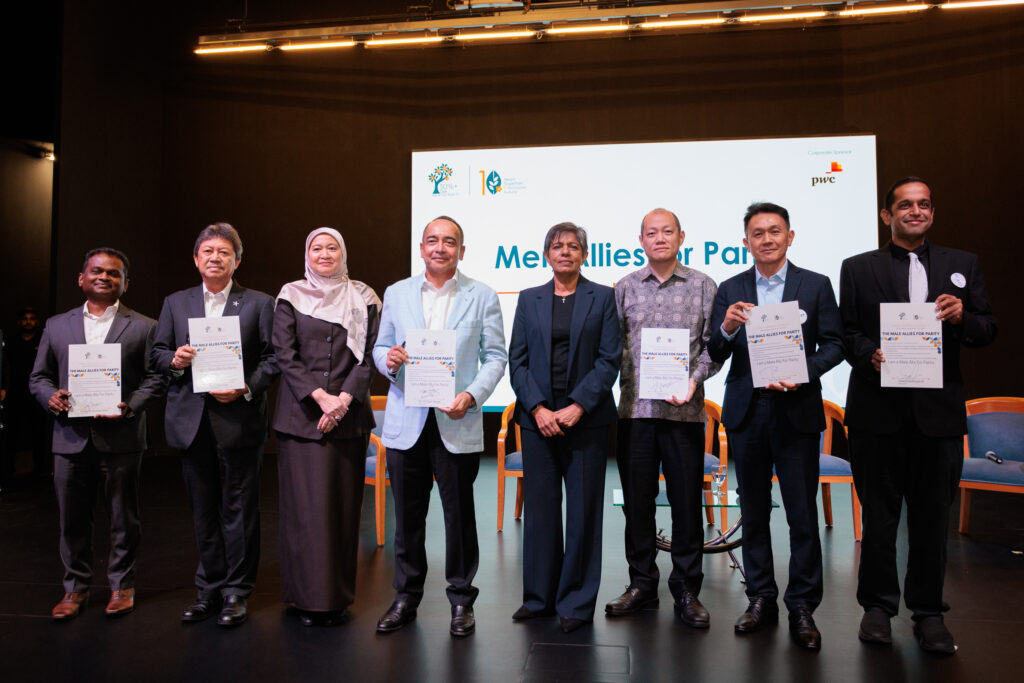
The 30% Club Malaysia has taken a decisive step toward advancing gender diversity with the launch of its “Men Allies for Parity” initiative.
This movement is designed to actively engage male leaders in boardrooms, C-suites, and policymaking roles, transforming them from supporters into advocates of systemic change for women’s representation in leadership.
“Our focus is on action. Male allies are making a clear pledge to support and promote women’s representation in top decision-making roles, including boardrooms and senior management,” said Nurul A’in Abdul Latif, Chair of the 30% Club Malaysia and Executive Chair of PwC Malaysia.
Data from the Securities Commission Malaysia (as of April 1, 2025) reveals that women now hold 33.1% of board seats in Malaysia’s top 100 public-listed companies (PLCs) – a substantial increase from 14% in 2015. Across all PLCs, women comprise 28% of board members, reflecting steady progress.
A Collective Commitment to Gender Parity
The Men Allies for Parity initiative aims to drive meaningful change by fostering shared responsibility among male leaders.
The initiative is not merely about advocacy – it is about taking concrete steps. Male allies commit to:
- – Advocating for emerging women leaders in
- senior roles.
- – Ensuring gender diversity in executive and
- board recruitment.
- – Setting clear targets to elevate women’s
- representation in leadership.
- – Maintaining transparency in reporting gender
- composition and progress.
This pledge is more than a symbolic gesture.
A light-touch monitoring framework will ensure accountability, tracking progress through case studies and success stories that can inspire other organisations to follow suit.
Celebrating a Decade of Progress
The launch of Men Allies for Parity coincided with the 30% Club Malaysia’s 10th Anniversary celebration in Kuala Lumpur.
The event was a moment of reflection, celebrating a decade of efforts to promote gender balance and inclusion at the highest levels of leadership.
“Balanced leadership is a strategic advantage. It is not about tokenism – it is about ensuring that the best talent, regardless of gender, has the opportunity to excel,” Nurul added.
The 30% Club Malaysia remains committed to its vision of a future where gender parity is not just an aspiration, but a reality—one where leadership is defined by diversity, inclusion, and shared success.
30%+ Club Ecuador Strengthens Women’s Leadership Through It’s 1:1 Mentorship Program
The 30%+Club Ecuador reaffirms its commitment to gender equity and women’s empowerment through its 1:1 Mentorship Program. In the program’s second edition, 24 high-potential women were individually guided by outstanding CEOs and executive presidents from multinational and national companies across various sectors. These leaders not only shared their experience but also facilitated new opportunities, helping participants overcome obstacles and advance toward high-level positions, such as senior management roles and board memberships.
This program aims to strengthen both the technical and interpersonal skills of participants, enabling them to reach strategic positions within their organizations. In Ecuador, this initiative is pioneering due to its focus on high-level leadership, providing participants with a comprehensive perspective on business management and decision-making, as well as offering a valuable network of contacts and professional development opportunities.
In its second edition (2024-2025), the program introduced three new elements designed to enhance the participant experience:
- Comprehensive personal assessment, evaluating not only interpersonal skills but also emotional intelligence.
- Rigorous selection process, ensuring participants have strong managerial experience and a well-defined purpose for joining the program.
- Broader mentor diversity, expanding representation not only in terms of gender but also across expertise areas and industry sectors.
WOMEN ON BOARDS: TRANSFORMING ECUADOR’S BUSINESS LEADERSHIP
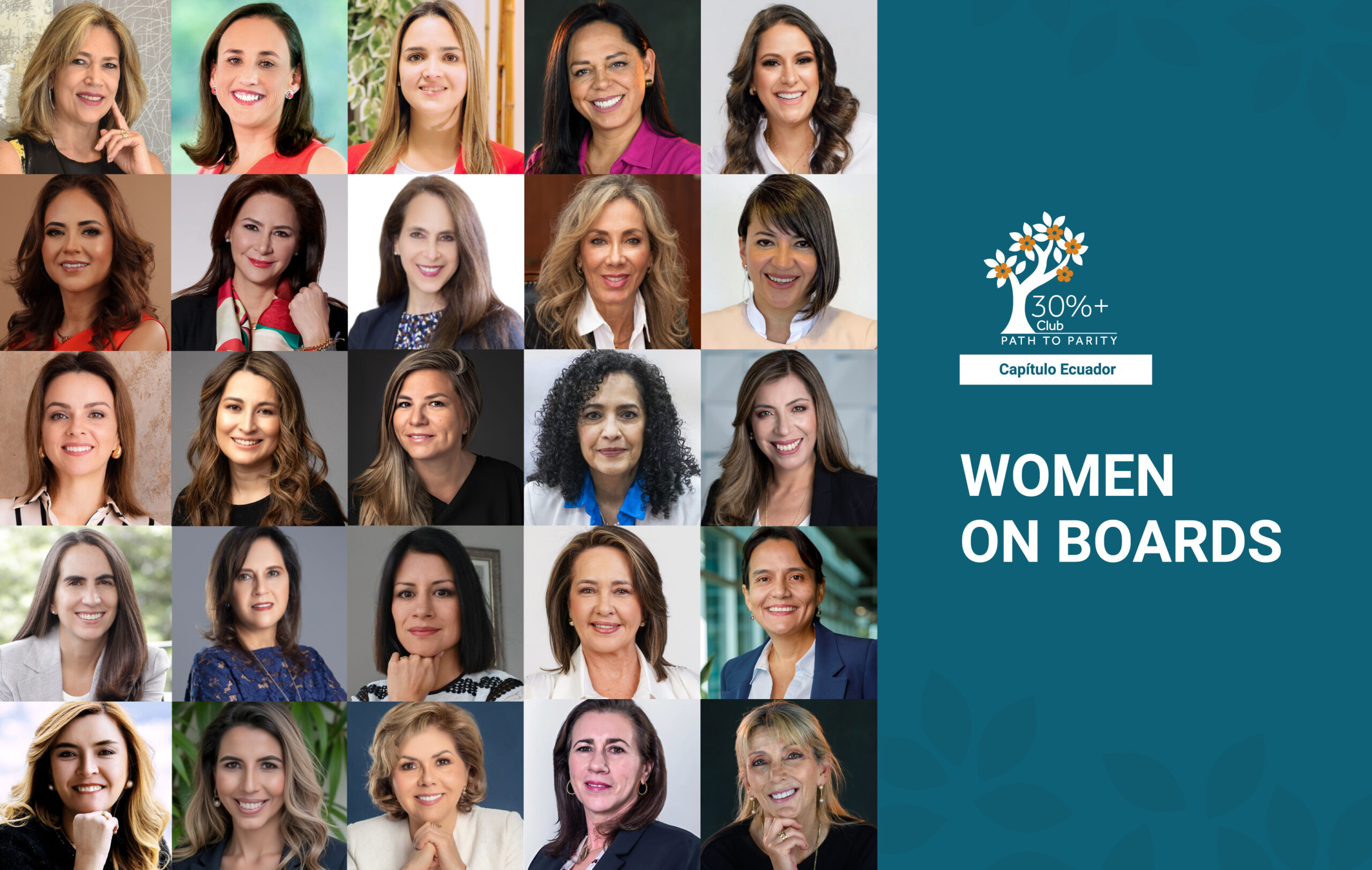
The 30%+Club Ecuador, a pioneer in promoting gender diversity in senior management positions in the country, presented its Women on Boards program in November 2024. This initiative aims to connect outstanding Ecuadorian female executives with opportunities on the boards of directors of the country’s leading companies.
Including women onto boards of directors generates multiple benefits for organizations, such as greater diversity of perspectives, more robust decision-making processes, and a boost to innovation. For women, it represents recognition of their career path and the opportunity to contribute significantly to business development.
The program features a rigorous selection process, requiring a minimum of five years in senior management positions, training in corporate governance and a proven ability to lead teams and manage complex projects. Candidates must also demonstrate analytical skills to assess the business environment and make strategic decisions.
Women on Boards stands out for its broad reach, bringing together 40 executives from diverse industries and sectors. Its community represents more than 10 economic sectors across the private, public, and nonprofit spheres, with expertise in areas such as technology, strategy, risk management, and sustainability.

